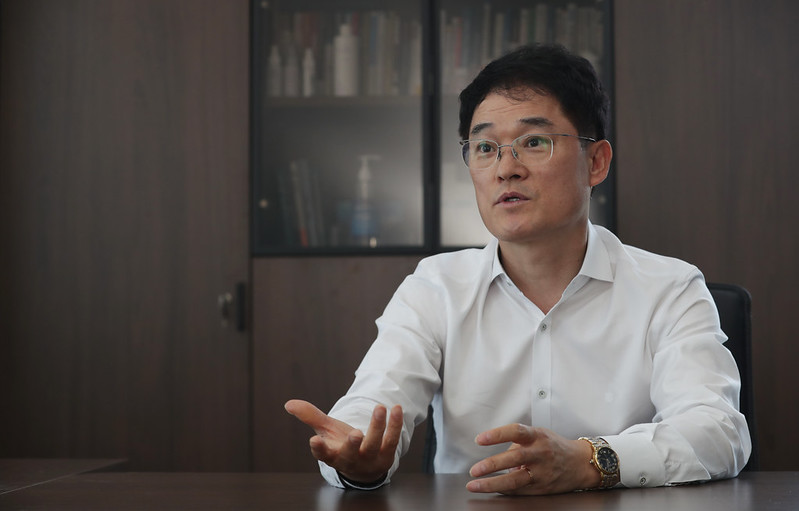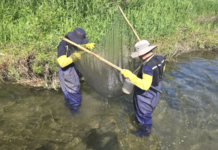
From May 5-22, Huons Medicare exported a combined 100,000 containers of hand sanitizer to the U.K. in three shipments. CEO Lee Sang-Man on June 16 speaks in an interview with Korea.net at his office in Seongnam, Gyeonggi-do Province. (Kim Sunjoo)
By Kim Minji and Lee Jihae
Sungnam | June 16, 2020
The Korean pharmaceutical company Huons Medicare in April received an urgent request from the British government for hand sanitizer, as the novel coronavirus disease (COVID-19) was rapidly sweeping Europe. The volume of international flights had drastically declined at the time due to the pandemic, making transporting the sanitizer difficult, but London sent transport planes to Incheon International Airport to receive them.
From early May, Huons exported a combined 100,000 containers of hand sanitizer to the U.K. in three shipments.
The British government ordered hand sanitizer from this small Korean pharmaceutical company rather than a global counterpart due to Huons’ high quality products and price competitiveness. Hu-Scrub, the hand sanitizer the U.K. ordered, is 1% chlorhexidine gluconate solution and 83% ethanol.
The efficiency of sanitization increases along with the proportion of the main ingredient ethanol, but this leads to side effects such as a higher risk of fire. So most sanitizers on the market are made of under 70% ethanol. To raise the proportion of ethanol, adequate balance of the proportion of the lowered auxiliary components is crucial but difficult.
Thus just a few manufacturers worldwide such as 3M and the Tokyo-based Saraya can produce hand sanitizer made of 80% or more ethanol. The British government selected Huons because the Korean company can self-produce hand sanitizer and thus offer lower prices.
“If we cannot match the proportion of auxiliary components, the efficiency of the hand sanitizer will decline or the chemicals will not mix,” he added. “Huons Medicare was able to make this product because of its continuous research on hand sanitizer since the company’s establishment in 1999.”
Huons is a small-to-medium company with 60 employees and annual turnover last year of KRW 35 billion. Though small, it is one of the country’s leading companies in infection prevention and sterilization and the only one in Korea that can produce both medical disinfectants and sterilizers. The output mechanism for disinfectants and machine sterilizers is different as both require an adequate mixture of chemicals, thus making the production of both items difficult.
“We are Korea’s first company to develop a biodecontamination system with our own technology,” Lee said in introducing the system, which Huons hopes eventually gains approval from the Nationally Recognized Testing Laboratory in the U.S.
“Disinfection in places such as surgery operating rooms, sound pressure isolation wards and fire engines has become more important since the COVID-19 outbreak. So we’ve developed a biodecontamination system that can eradicate 99.99999% of germs in such places,” he added.
Biological indicators (BI), which display the survival of germs, used to be developed in Korea based on imports. Huons has developed the nation’s first BI made with domestic technology; its release on the market is set for next year.
The company’s turnover has increased 30% from the same period last year due to its exports to the U.K.
“We are negotiating the terms and conditions of additional export requests from the U.K.,” said Bong Peel-jun, an assistant manager at Huon’s overseas sales team. “It seems like the general (British) public as well as specialists are requesting the sanitizer.”
Huons is also receiving requests for sanitizer exports from other countries such as the U.S., Israel and China.
“Exports to the U.K. have becoming a steppingstone for expansion to the global market,” said CEO Lee. “We will become a corporation that promotes worldwide the excellence of Korea’s quarantine know-how.”
kimmj7725@korea.kr























